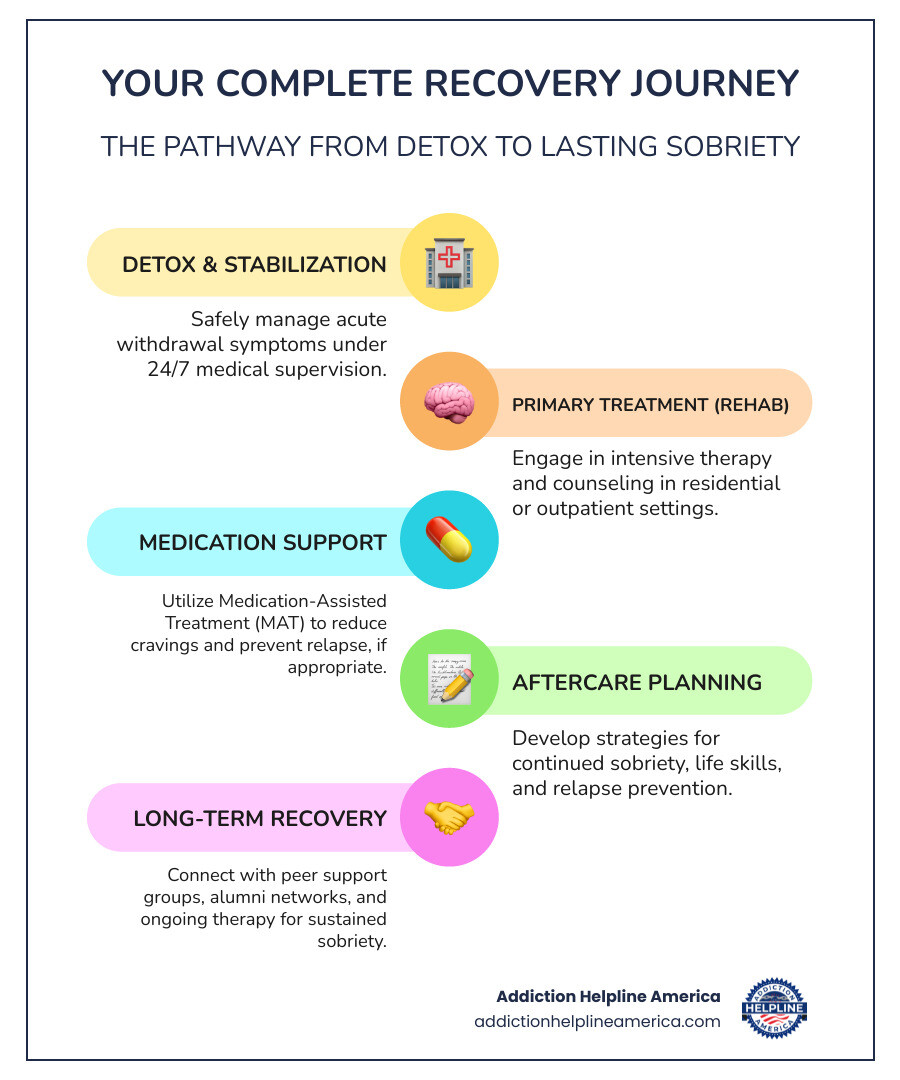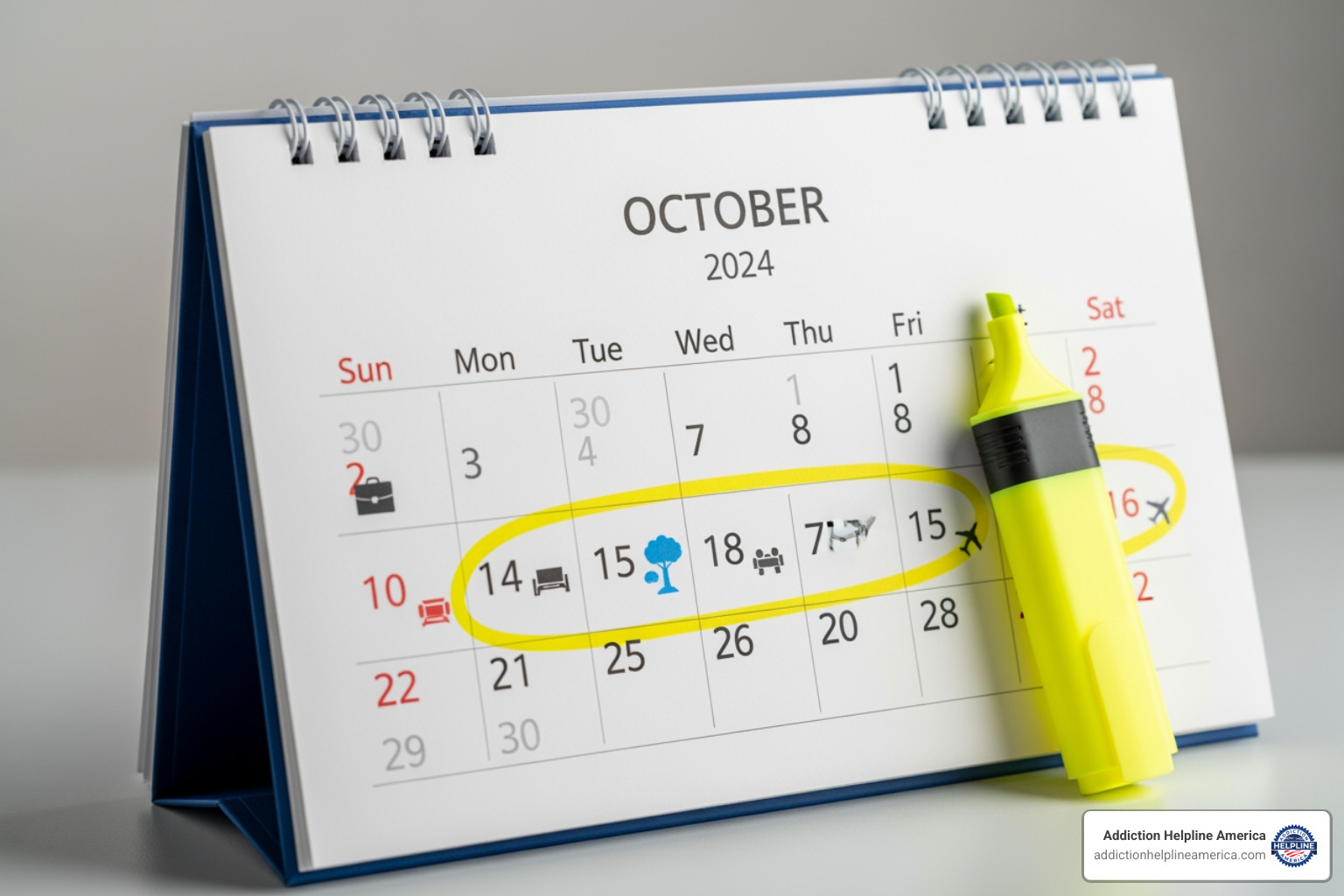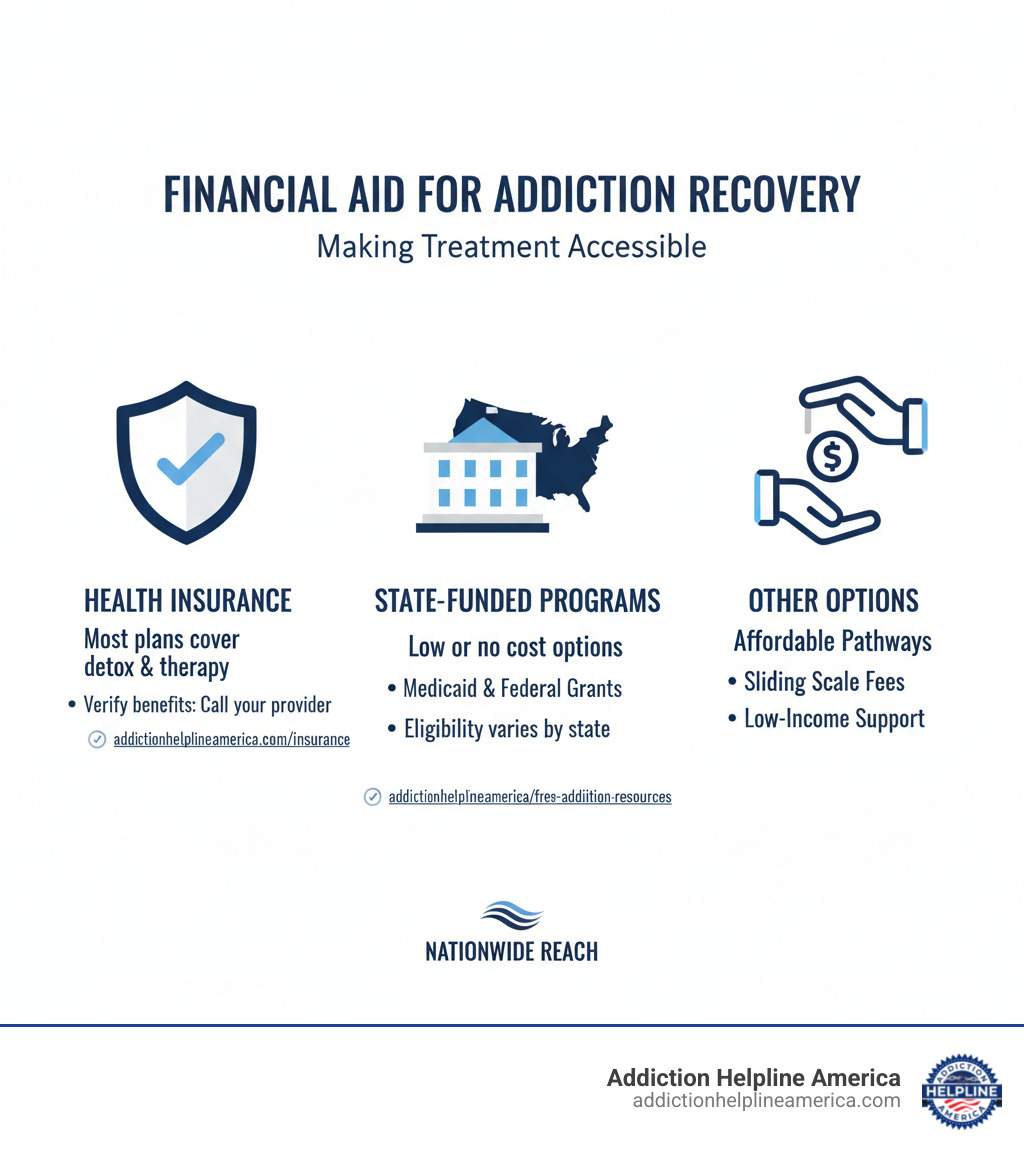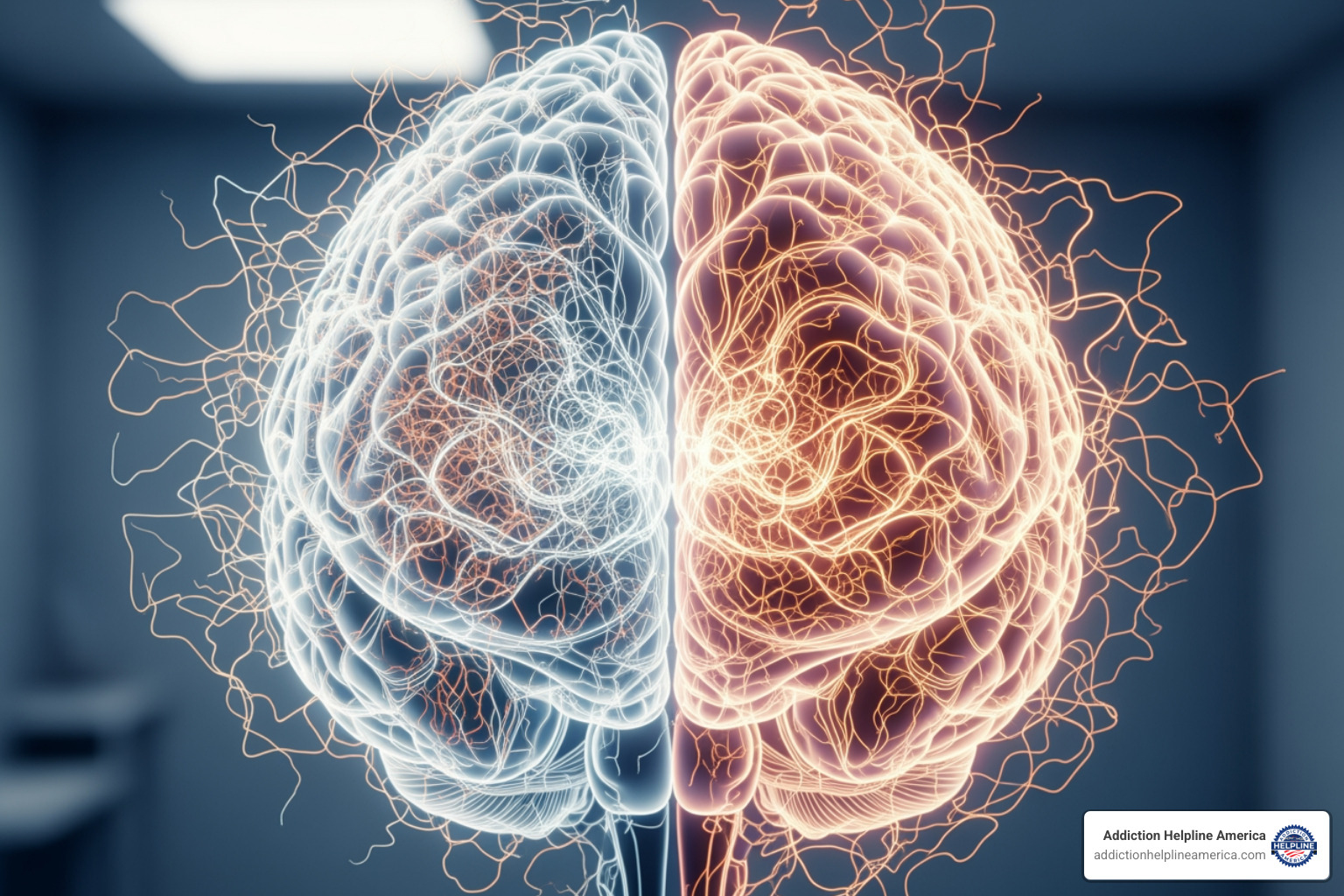
Addiction Helpline America – Free, Confidential 24/7 Support
Detox drug treatment near me provides medically supervised withdrawal management as the critical first step in addiction recovery. Here’s what you need to know:
Quick Answer: Finding Detox Drug Treatment Near You
- Call SAMHSA’s National Helpline at 1-800-662-HELP (4357) for immediate referrals
- Use FindTreatment.gov to search for licensed facilities by location
- Contact your insurance provider to verify coverage and get in-network options
- Look for accredited facilities offering 24/7 medical supervision and medication-assisted treatment
If you or a loved one is struggling with addiction, searching for help is the most important step you can take. Professional detox is not just important—it can be life-saving. Withdrawal from substances like alcohol, benzodiazepines, and opioids can cause dangerous medical complications. Yet in 2022, of the 54.6 million people who needed substance use treatment, only about 13.1 million received it.
The gap between needing and getting help is real, but it doesn’t have to be your story. This guide walks you through finding safe, effective detox in your area, explaining program differences, medication options, and how to pay for treatment.
At Addiction Helpline America, we’ve helped thousands find detox drug treatment near me that meets their unique needs. Our team of addiction specialists is here to connect you with the right resources and support you on your journey.

Simple guide to detox drug treatment near me:
Step 1: Understanding the Critical Need for Professional Detox
When you search for detox drug treatment near me, you’re looking for a safe, medically supervised process to manage withdrawal. After prolonged substance use, the body becomes physically dependent. Suddenly stopping use triggers withdrawal symptoms that can be uncomfortable, dangerous, and even deadly.
That’s why professional, medically supervised detox is critical. It provides the medical oversight, medication, and emotional support needed to withdraw safely. It’s not about “toughing it out”—it’s about giving your body the best chance to heal. For those dealing with alcohol dependence, our guide on Detox Alcohol Treatment explores these challenges in more detail.

The Dangers of Detoxing at Home vs. The Safety of Professional Help
While the idea of detoxing at home is tempting for privacy or cost reasons, it’s extremely risky. Unsupervised withdrawal can quickly become a medical emergency. Symptoms can escalate without warning, leading to life-threatening complications.
Here’s a comparison of the two approaches:
| Feature | At-Home Detox (Unsupervised) | Professional Medically-Supervised Detox |
|---|---|---|
| Medical Monitoring | None—you’re on your own to assess symptoms | 24/7 monitoring of vital signs, symptoms, and complications |
| Medication Access | No access to withdrawal-easing medications | FDA-approved medications to reduce discomfort and prevent complications |
| Seizure Risk | High risk with no immediate intervention available | Medical staff can prevent and immediately treat seizures |
| Delirium Tremens (DTs) | Life-threatening condition with no medical support | Recognized and treated immediately by trained professionals |
| Dehydration Management | Difficult to manage severe dehydration alone | IV fluids and electrolyte management as needed |
| Relapse Prevention | Extremely high relapse risk due to severe discomfort | Lower relapse risk with symptom management and support |
| Emotional Support | Isolation during a vulnerable time | Compassionate staff, counseling, and peer support |
| Success Rate | Very low—most people cannot complete detox at home | Significantly higher completion rates with medical support |
Seizures and Delirium Tremens (DTs) are severe, potentially fatal complications of alcohol and benzodiazepine withdrawal that medical teams are trained to prevent and treat immediately.
Professional detox makes withdrawal not just more comfortable, but survivable. A medical team monitors you around the clock, adjusts your treatment as needed, and provides support when cravings feel unbearable. You deserve to detox safely and with dignity, which is what professional detox drug treatment near me provides.
Call Now – Your Journey to Recovery Begins Today!

Take the first step towards a healthier life! Call now to connect with our compassionate team and start your recovery journey today. Your path to healing awaits!
Our recovery specialists are available 24/7 to provide support, and all calls are confidential and free. Reach out anytime – we’re here to help!
Common Withdrawal Symptoms and Side Effects
Withdrawal symptoms vary by substance, duration of use, and individual health. Understanding what to expect reinforces the need for medical supervision.
- Alcohol Withdrawal: Begins within 6-12 hours with anxiety, tremors, and nausea. Can escalate to seizures and delirium tremens (DTs), a medical emergency, within 48-72 hours.
- Opioid Withdrawal: Often described as a severe flu with intense muscle aches, nausea, vomiting, and powerful cravings. Dehydration is a primary risk, but medical support can manage symptoms and prevent relapse.
- Benzodiazepine Withdrawal: Extremely dangerous to attempt alone. Sudden cessation of drugs like Xanax or Valium can cause seizures, panic attacks, and psychosis. Requires a careful, medically managed tapering schedule.
- Stimulant Withdrawal: Primarily psychological but overwhelming. Expect severe fatigue, depression, and intense cravings. The depression can lead to suicidal thoughts, making psychiatric support essential.
Psychological side effects like anxiety, depression, irritability, and intense cravings are common across all types of withdrawal. A medical detox team can provide medications and therapies to manage these symptoms.
These symptoms can be intimidating, but you don’t have to face them alone or suffer unnecessarily. Medical detox is designed to make this process as safe and comfortable as possible. That’s the goal of finding professional detox drug treatment near me.
Step 1: Understanding the Critical Need for Professional Detox
- Drug and alcohol detox: Define it, explain its importance as the first step.
- Physical dependence: Explain how it necessitates detox.
- Managing withdrawal: Introduce the concept of medical management.
- Internal Link: Detox Alcohol Treatment
- Image:
The Dangers of Detoxing at Home vs. The Safety of Professional Help
- Table: Compare risks and benefits of At-Home Detox vs. Professional Medically-Supervised Detox.
- At-Home Risks: unsupervised withdrawal, seizures, Delirium Tremens (DTs), dehydration, relapse risk. Research states: “Quitting certain substances like alcohol cold turkey can be life-threatening.” and “Detoxing at home is risky and dangerous due to potential triggers for relapse and severe, life-threatening withdrawal symptoms (like delirium tremens from alcohol) that require professional medical attention.”
- Professional Benefits: medical supervision, 24/7 care, emotional support. Research states: “Professional drug detox programs use interventions like medications and therapies to safely manage withdrawal side effects.”
- Mention the ASAM recommendation against rapid detox here if it fits the “safety of professional help” context, or later in “Types of Detox Programs”. (Research states: “The American Society of Addiction Medicine (ASAM) does not recommend rapid detox because of its various dangerous and potentially life-threatening risks.”)
Common Withdrawal Symptoms and Side Effects
- Substance-specific withdrawal: Mention alcohol, opioid, benzodiazepine, stimulant withdrawal symptoms.
- Alcohol: Seizures, DTs (already mentioned, but reinforce).
- Opioid: Flu-like symptoms, nausea, diarrhea, cravings. (Research states: “The discomfort of opioid withdrawal symptoms like nausea and diarrhea.”)
- Benzodiazepine: Seizures, anxiety, insomnia.
- Stimulant: Depression, fatigue.
- Psychological side effects: Anxiety, depression, cravings. (Research states: “Mood swings, anxiety, and depression as common withdrawal side effects.”)
- Image:
Step 2: Exploring Your Detox Program and Medication Options
Finding the right program is the next step. Since addiction is unique to each person, treatment must be personalized. When you contact a detox drug treatment near me, the process begins with a thorough assessment of your substance use history, physical health, and mental health to create a custom plan.
Approximately 50% of people with substance use disorders also have co-occurring mental health conditions (dual diagnosis). Quality programs address both addiction and mental health simultaneously for effective treatment. Understanding the different therapeutic approaches can help you make an informed decision. Learn more about Types of Addiction Therapy that may be part of your plan.
Different Types of Drug Detox Programs
The right level of care depends on your substance use, health, and home environment.
- Inpatient Detox: This involves staying at a facility 24/7 with constant medical supervision. It is recommended for those detoxing from alcohol, benzodiazepines, or opioids, or for individuals with a high risk of relapse. It provides a safe, trigger-free environment.
- Outpatient Detox: This allows you to live at home while attending daily or weekly treatment sessions. Options include Partial Hospitalization Programs (PHP) and Intensive Outpatient Programs (IOP). This is best for those with less severe addictions and a strong support system, but not for substances with dangerous withdrawal symptoms.
Avoid rapid detox, where patients are put under anesthesia. The American Society of Addiction Medicine (ASAM) does not recommend it due to dangerous, life-threatening risks. It is expensive and no more effective than standard medical detox.
If cost is a concern, options like Free Inpatient Drug Rehab Programs are available.
Medications Used in Medically Supervised Detox
Medication-Assisted Treatment (MAT) is a key advantage of professional detox, making withdrawal safer and more comfortable.
- For Opioid Detox: Medications like Buprenorphine (Suboxone) reduce cravings and withdrawal symptoms. You can find providers via the Buprenorphine Practitioner Locator. Methadone, available through Opioid Treatment Programs, is another effective option. Naltrexone can be used after detox to prevent relapse.
- For Alcohol Detox: Benzodiazepines are often used to prevent seizures and anxiety, with the dose carefully tapered down. After detox, medications like Acamprosate (reduces cravings) and Disulfiram (deters drinking) can support sobriety.
Doctors may also prescribe “comfort medications” for specific symptoms like insomnia or nausea. MAT is most effective when combined with counseling and therapy.
How Long Does Detox Typically Last?
The duration of detox varies, typically lasting from a few days to a few weeks. The timeline depends on several factors:
- Type of substance: Alcohol withdrawal often peaks in 1-3 days, while opioid withdrawal peaks around day three. Benzodiazepine withdrawal can be more prolonged.
- Duration and severity of addiction: Longer and heavier use generally requires a longer detox.
- Individual health: Overall physical and mental health plays a role.
- Use of multiple substances: Polysubstance use can complicate and extend the detox process.
Most people complete the acute phase of detox in seven to ten days. Lingering symptoms are normal as your body and brain heal. Detox is just the first step; don’t rush the process. Lasting sobriety requires ongoing support.

Detox is just the beginning of your recovery journey. While it’s an essential first step, lasting sobriety requires ongoing treatment and support. Don’t rush this process—give yourself the time you need to heal properly.
Call Now – Your Journey to Recovery Begins Today!

Take the first step towards a healthier life! Call now to connect with our compassionate team and start your recovery journey today. Your path to healing awaits!
Our recovery specialists are available 24/7 to provide support, and all calls are confidential and free. Reach out anytime – we’re here to help!
Step 3: How to Find and Pay for Detox Drug Treatment Near Me
Finding the right detox drug treatment near me and figuring out how to pay for it can feel overwhelming, but help is more accessible than you think. At Addiction Helpline America, we help you steer your options and overcome financial barriers. Let’s explore how to find a quality detox center and make it affordable. For more guidance, see our guide on How to Choose the Right Rehab.
How to Find a Drug Detox Center Near Me
Several reliable resources can connect you with a quality detox center:
- SAMHSA’s National Helpline: For immediate, free, and confidential referrals, call the National Helpline at 1-800-662-HELP (4357). This service is available 24/7.
- FindTreatment.gov: Use this official online tool to search for facilities by location, services, and payment options.
- Your Physician or Therapist: Healthcare professionals can provide personalized recommendations based on your medical history and needs.
- Your Insurance Provider: Contact your insurer to get a list of in-network facilities, which can significantly reduce your costs.
What to Look for in a Detox Drug Treatment Near Me
When searching for detox drug treatment near me, look for these key qualities:
- Licensing and Accreditation: Ensure the center is licensed by the state and accredited by a national body like The Joint Commission or CARF.
- 24/7 Medical Supervision: The facility must provide round-the-clock nursing care with physicians and counselors on call to manage complications.
- Individualized Treatment Plans: Avoid one-size-fits-all programs. The best centers create a personalized plan based on your unique history and needs.
- Evidence-Based Therapies and Aftercare Planning: The clinical team should use scientifically proven therapies, and the program should include planning for the next stage of your recovery.
Addiction Helpline America connects people to a nationwide network of accredited facilities that meet these high standards. We can help you find quality care in your state, from California to Florida.
Paying for Treatment: Insurance and State-Funded Options
Cost is a major concern, but treatment is often more affordable than people think. Most insurance plans cover at least some of the cost of detox and rehab, thanks to laws like the Affordable Care Act.
Always verify your insurance benefits before admission. A treatment center’s financial representative can help you understand your coverage and out-of-pocket costs. We provide information on various plans, such as Cigna Insurance Rehab Coverage.
If you don’t have insurance, you still have options:
- State-funded rehab centers offer low-cost or no-cost treatment, often funded by SAMHSA grants and Medicaid. Eligibility typically depends on residency, income, and insurance status.
- Sliding scale fees are offered by many facilities, adjusting the cost based on your income.
- Payment plans can help you spread out the cost over time.
Don’t let financial barriers stop you. Ask about all available options. For more information, visit our guide on Free Addiction Resources.

The bottom line? Treatment is more affordable and accessible than many people realize. Whether through insurance, state-funded programs, sliding scale fees, or other financial assistance options, there’s a path forward. You don’t have to figure this out alone—we’re here to help you explore every option available.
Life After Detox: The Next Steps in Your Recovery Journey
Completing detox is a major accomplishment, but detox is only the first step. It clears substances from your body but doesn’t address the underlying psychological and social aspects of addiction. Lasting recovery requires learning new coping skills and understanding the root causes of substance use.
This next phase is about addressing the psychological addiction and building a foundation for sobriety. Addiction Helpline America can help you transition from detox to the right continuing care program, as what comes next is critical for long-term success. Learn more in our guide on the Importance of Aftercare in Addiction.

Transitioning to Ongoing Treatment
After detox, you’ll transition to a program that addresses the root causes of addiction. The right level of care depends on your needs.
- Residential Treatment (Inpatient): You live at the facility for 30-90 days in a structured, trigger-free environment. This is the most intensive level of care.
- Outpatient Programs (PHP/IOP): You live at home and attend treatment several times a week, offering flexibility to maintain work or school.
- Sober Living Homes: These offer a supportive, substance-free home with peer support and accountability as you transition to independent life.
Treatment includes individual, group, and family therapy to develop coping skills, connect with peers, and repair relationships. Family involvement is often key; learn more in our Recovery for Families resource.
Building a Support System for Long-Term Sobriety
Long-term sobriety requires an ongoing support system. Key components include:
- 12-Step Programs: Groups like Alcoholics Anonymous (AA) and Narcotics Anonymous (NA) offer free, structured peer support.
- SMART Recovery: A self-empowering, science-based alternative to 12-step programs.
- Peer Support Groups: Connecting with others in recovery through local or online communities provides encouragement and understanding.
- Alumni Programs: Many treatment centers offer programs to keep you connected to a supportive community after you leave.
- Relapse Prevention Planning: A crucial strategy that involves identifying triggers and developing a plan to handle high-risk situations.
If a loved one needs encouragement to seek help, our guide on Holding an Intervention can provide guidance.
Recovery is a journey, not a destination. The support systems you build now will serve you for years to come, helping you steer challenges, celebrate victories, and continue growing into the person you want to be.
Call Now – Your Journey to Recovery Begins Today!

Take the first step towards a healthier life! Call now to connect with our compassionate team and start your recovery journey today. Your path to healing awaits!
Our recovery specialists are available 24/7 to provide support, and all calls are confidential and free. Reach out anytime – we’re here to help!
Conclusion
Finding detox drug treatment near me is achievable. We’ve covered the critical steps: understanding the need for professional detox, exploring your program options, and learning how to find and pay for care. Each step is vital: professional detox ensures safety, the right program addresses your unique needs, and knowing your financial options removes barriers.
Recovery is possible. We’ve seen it thousands of times. The most important thing is to not wait. Addiction doesn’t improve on its own, and delaying treatment can be dangerous.
You are not alone. At Addiction Helpline America, we provide free, confidential, and personalized guidance. Our team knows the treatment landscape and can help you steer your options without judgment. We work with a vast network of treatment centers nationwide and can connect you with inpatient, outpatient, or state-funded programs that fit your needs and budget.
Take the first step today. Reach out to us, call SAMHSA’s National Helpline, or use FindTreatment.gov. Talk to your doctor or check your insurance benefits. Any step forward is a step toward freedom. Your life is worth it.
Find addiction help and resources now and begin your journey to a healthier, substance-free future. We’re ready to help whenever you’re ready to start.
Addiction Helpline America – Free, Confidential 24/7 Support
Detox drug treatment near me provides medically supervised withdrawal management as the critical first step in addiction recovery. Here’s what you need to know:
Quick Answer: Finding Detox Drug Treatment Near You
- Call SAMHSA’s National Helpline at 1-800-662-HELP (4357) for immediate referrals
- Use FindTreatment.gov to search for licensed facilities by location
- Contact your insurance provider to verify coverage and get in-network options
- Look for accredited facilities offering 24/7 medical supervision and medication-assisted treatment
If you or someone you love is struggling with addiction, you’ve already taken the most important step by searching for help. Professional detox can be life-saving. Withdrawal from alcohol, benzodiazepines, and opioids may cause seizures, delirium tremens, or severe dehydration. In 2022, of the 54.6 million people aged 12 or older who needed substance use treatment, only about 13.1 million received it—don’t wait to be part of that gap.
This guide outlines three critical steps to find safe, effective detox in your area, what medications may help, and how to pay for care.
At Addiction Helpline America, we help people nationwide find detox drug treatment near me that fits their needs with free, confidential, and personalized guidance.
Simple guide to detox drug treatment near me:
Step 1: Understanding the Critical Need for Professional Detox
When we talk about drug and alcohol detox, we mean a medical process that safely clears substances from your body while managing withdrawal. After prolonged use, the brain adapts—creating physical dependence. Stopping suddenly can trigger withdrawal that ranges from uncomfortable to dangerous. Professional detox drug treatment near me provides medical supervision, medications, and support to keep you safe. For more on alcohol-specific risks, see Detox Alcohol Treatment.
The Dangers of Detoxing at Home vs. The Safety of Professional Help
Attempting detox at home increases the risk of medical emergencies and relapse. Medically supervised programs use evidence-based care and continuous monitoring to manage complications.
| Feature | At-Home Detox (Unsupervised) | Professional Medically-Supervised Detox |
|---|---|---|
| Medical Monitoring | No medical oversight | 24/7 monitoring by nurses and physicians |
| Seizure Risk | High with no immediate help | Protocols and meds to prevent/treat seizures |
| Delirium Tremens (DTs) | Potentially fatal without treatment | Rapid recognition and medical intervention |
| Medication Support | No access to prescription support | FDA-approved meds to ease symptoms/cravings |
| Relapse Prevention | Triggers and easy access to substances | Substance-free setting with support |
| Completion Rate | Low—many return to use quickly | Higher due to structure and accountability |
The American Society of Addiction Medicine (ASAM) does not recommend rapid detox under anesthesia due to serious, potentially life-threatening risks and no proven long-term benefit.
Common Withdrawal Symptoms and Side Effects
- Alcohol: Tremors, nausea, anxiety; in some cases seizures or DTs. Medical care is essential.
- Opioids: Severe flu-like symptoms, GI upset, intense cravings. Medications like buprenorphine (find providers via SAMHSA’s Buprenorphine Practitioner Locator) can help.
- Benzodiazepines: Anxiety, insomnia, panic, seizures. Requires a carefully managed taper.
- Stimulants: Profound fatigue, depression, strong cravings; psychiatric support may be needed.
- Psychological symptoms (all substances): Anxiety, depression, irritability, and cravings are common.
Professional medical detox isn’t about “toughing it out”—it’s about safety, comfort, and giving yourself the best chance at lasting recovery.
Our helpline is 100%
free & confidential
If you or someone you care about is struggling with drug or alcohol addiction, we can help you explore your recovery options. Don’t face this challenge alone—seek support from us.
Programs
Resources
Will my insurance
cover addiction
treatment?
We're ready to help
Find the best
drug or alcohol treatment
center
Are you or a loved one struggling with addiction? Call today to speak to a treatment expert.
















